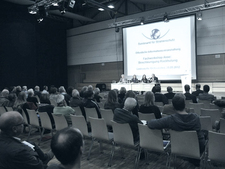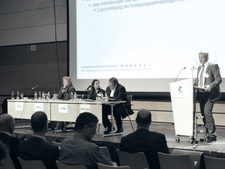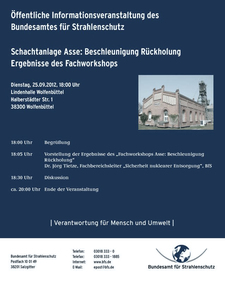Safe closure of the Asse repository can be accelerated
BfS presents results of the two-day expert workshop in Wolfenbüttel
end 2012.09.25
location Wolfenbüttel

![]() Public event on the Asse expert conference on 25 September 2012 at Wolfenbüttel Lindenhalle
Public event on the Asse expert conference on 25 September 2012 at Wolfenbüttel Lindenhalle
Works on the safe closure of the Asse mine can be accelerated. That is the result of the two-day expert workshop which the Federal Office for Radiation Protection (BfS) had invited experts to and which took place in Wolfenbüttel on 24 and 25 September 2012. In a constructive and solution-oriented atmosphere, 110 experts from all over the country discussed concrete options to accelerate the decommissioning of Asse.
Possibilities of speeding up the process
The only option to safely close the Asse mine is, according to current knowledge, retrieving the waste from the repository. In order to speed up retrieval – this is one conclusion of a participant – the new shaft 5 and the interim storage facility should be planned and constructed without delay. The new shaft 5 is required to recover the waste from the mine in a safe manner. Moreover, more miners could be deployed underground. The interim storage facility is necessary to store the waste until they will be disposed of.

![]() Presentation of the results of the two-day expert workshop - on the podium from left to right: Stefanie Nöthel (BfS), Katharina Varga (BfS), Landrat Jörg Röhmann (Asse-2-accompanying-group), Jörg Tietze (BfS)
Presentation of the results of the two-day expert workshop - on the podium from left to right: Stefanie Nöthel (BfS), Katharina Varga (BfS), Landrat Jörg Röhmann (Asse-2-accompanying-group), Jörg Tietze (BfS)
At the workshop on acceleration, the Asse experts declared to use the contaminated saline solutions in front of emplacement chamber 12 in a depth of 750 metres – for which there has been no possibility of disposal so far – to mix sorel concrete in order to backfill cavities in the mine that are no longer entered.
Adjust general schedule until the end of 2012
According to the experts, up to ten years can be saved per partial project (such as the interim storage facility). How much time it will be possible to save by the suggested acceleration processes for recovering the waste earlier cannot be predicted yet.
All results are to be combined after the workshop in order to adapt the general schedule until the end of 2012. The BfS had declared repeatedly that it could not accept retrieval starting as late as in 2036 according to the previous schedule.
Trial phase
On 1 June, the BfS started the trial phase with the help of which it should be investigated whether it would be possible to safely recover the 126,000 drums containing low-level and intermediate-level radioactive waste. In this trial phase, two selected emplacement chambers are drilled into, opened and first waste containers are recovered test-wise in three steps. Then it will have to be decided whether it will be possible or not to retrieve all drums.
Background

![]() Invitation to the public briefing
Invitation to the public briefing
The expert workshop was based on the Asse expert workshop which the BfS had organised in January. About 100 experts from all over Germany took part in the workshop. One result of the workshop was that, according to current knowledge, the safe long-term decommissioning can only be achieved when the waste will be retrieved. At the same time, the BfS found that this order could only be implemented if options were found to speed up things, which were supported by all parties involved and only if all parties involved worked together for the safe decommissioning of the Asse mine.
Subsequent to this initial workshop in January 2012, Arcadis GmbH submitted a general schedule (in German) on behalf of the BfS on 21 May 2012 which describes the technical details and the time schedule of retrieval on the basis of the previously made experiences and the given boundary conditions. According to these statements, retrieval of the radioactive waste could not be started with prior to 2036. The BfS cannot accept this data taking into account the safety-related boundary conditions of the Asse II mine. Thus it is imperative to speed up the start of retrieval.
Address
38300 Wolfenbüttel
Germany

